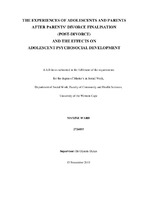| dc.contributor.advisor | Glynnis, Dykes | |
| dc.contributor.author | Ward, Maxine | |
| dc.date.accessioned | 2020-10-28T07:24:54Z | |
| dc.date.available | 2020-10-28T07:24:54Z | |
| dc.date.issued | 2019 | |
| dc.identifier.uri | http://hdl.handle.net/11394/7383 | |
| dc.description | Magister Artium (Social Work) - MA(SW) | en_US |
| dc.description.abstract | Divorce is a world-wide phenomenon. Divorce means the ending of a marriage after a period of unity and bonding; and thus it can take a long time to recover emotionally, particularly for children. Concerningly, half of marriages ends in divorce. Studies found that divorce has an effect on the well-being, behaviour and actions of both adults and children. Children’s lives change irrevocably and it can be contributed to the parents’ separation or divorce. The manner in which children respond emotionally and psychologically to divorce is dependent on their age, and this event could be both confusing and traumatising. The adolescent stage is viewed as the most vulnerable stage of development, where identity is the primary focus; and thus these children are most severely impacted by their parents’ divorce. There was a dearth of studies on the effects of divorce on adolescents after the divorce finalisation, known as post-divorce phase, and thus no clear interventions. | en_US |
| dc.language.iso | en | en_US |
| dc.publisher | University of the Western Cape | en_US |
| dc.subject | Adolescent | en_US |
| dc.subject | Adolescence | en_US |
| dc.subject | Divorce | en_US |
| dc.subject | Post-divorce | en_US |
| dc.subject | Psychosocial development | en_US |
| dc.title | The experience of adolescents and parents after divorce finalisation (post-divorce) and the effects on adolescent psychosocial development | en_US |
| dc.rights.holder | University of the Western Cape | en_US |

